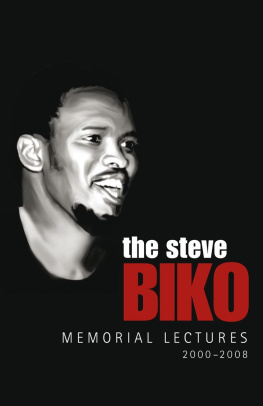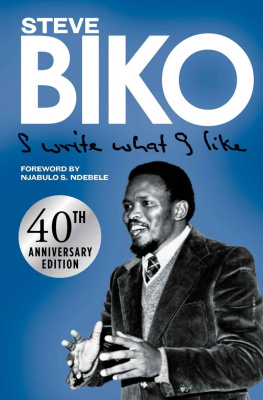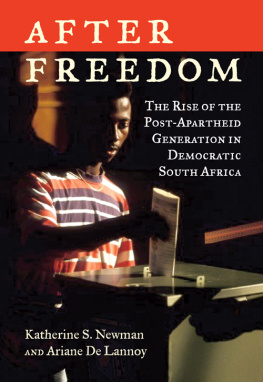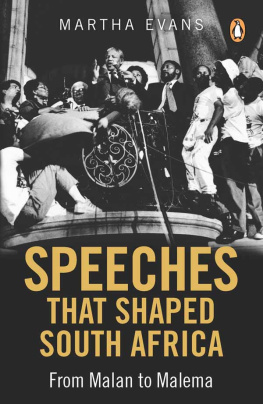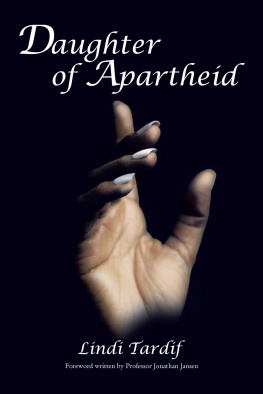Steve Biko
OHIO SHORT HISTORIES OF AFRICA
This series of Ohio Short Histories of Africa is meant for those who are looking for a brief but lively introduction to a wide range of topics of South African history, politics, and biography, written by some of the leading experts in their fields.
Steve Biko
by Lindy Wilson
ISBN: 978-0-8214-2025-6
e-ISBN: 978-0-8214-4441-2
Spear of the Nation (Umkhonto weSizwe):
South Africas Liberation Army, 1960s1990s
by Janet Cherry
ISBN: 978-0-8214-2026-3
e-ISBN: 978-0-8214-4443-6
Epidemics:
The Story of South Africas Five Most Lethal Human Diseases
by Howard Phillips
ISBN: 978-0-8214-2026-3
e-ISBN: 978-0-8214-4443-6
A Brief History of Rights in South Africa
by Saul Dubow
ISBN: 978-0-8214-2027-0
e-ISBN: 978-0-8214-4440-5
Steve Biko
Lindy Wilson
OHIO UNIVERSITY PRESS
ATHENS
Ohio University Press, Athens, Ohio 45701
www.ohioswallow.com
All rights reserved
Lindy Wilson, 2011
First published in 2011 by Jacana Media (Pty) Ltd
10 Orange Street, Sunnyside
Auckland Park 2092
South Africa
(+29 11) 628-3200
www.jacana.co.za
To obtain permission to quote, reprint, or otherwise reproduce or distribute material from Ohio University Press publications, please contact our rights and permissions department at (740) 593-1154 or (740) 593-4536 (fax).
First published in North America in 2012 by Ohio University Press Printed in the United States of America
Ohio University Press books are printed on acid-free paper

20 19 18 17 16 15 14 13 12 5 4 3 2 1
ISBN: 978-0-8214-2025-6
e-ISBN: 978-0-8214-4441-2
Library of Congress Cataloging-in-Publication Data
Wilson, Lindy.
Steve Biko / Lindy Wilson.
p. cm. (Ohio short histories of Africa)
First published in 2011 by Jacana Media, Auckland Park, South Africa. Includes bibliographical references and index.
ISBN 978-0-8214-2025-6 (pb : alk. paper) ISBN 978-0-8214-4441-2 (electronic)
1. Biko, Steve, 1946-1977. 2. Political activistsSouth Africa. 3. South AfricaHistory1961-1994. 4. South AfricaRace relations. 5. South AfricaPolitics and government1994- I. Title. II. Series: Ohio short histories of Africa.
DT779.8.B48W55 2012
968.06092dc23
[B]
2012020802
Cover design by Joey Hi-Fi
Photo credits: Steve Biko Foundation, p..
Contents
Preface
This brief biography of Bantu Stephen Biko is grounded in relevant published literature. Much written evidence has been lost, was deliberately destroyed or carefully not recorded, out of fear of reprisals in a fearful age. Thus Bikos story draws substantially from interviews. Some were done with Biko himself, particularly near the end of his life. Twenty-six were conducted in 1989 and 1990 before the end of apartheid. Interviews, of course, have weaknesses as historical sources. They are subjective and also rely on memory, often blurred and distorted by time and perspective. Further, describing anothers life is sometimes a projection of ones own.
An earlier version of this biography was published in 1991 as a chapter in the book Bounds of Possibility. It was written at the invitation of Barney Pityana, Malusi Mpumlwana and Mamphela Ramphele, the co-editors of the book, who have kindly agreed to my revising it for publication in this form.
Introduction
September 77
In Port Elizabeth weather fine
It was business as usual In Police Room 619
Biko, by Peter Gabriel
On 12 September 1977 business as usual for the South African Security Police claimed the life of Bantu Stephen Biko, the twenty-first person to die in a South African prison within a period of twelve months. Biko was 30 years old.
Ten days earlier Biko was reported to be physically sound when visited by a magistrate at the Walmer police cells in Port Elizabeth. He did, however, request water and soap to wash himself and a washcloth and a comb, and added: I want to be allowed to buy food. I live on bread only here. Is it compulsory that I have to be naked? I have been naked since I came here.
On the morning of 6 September, Biko faced a team of Security Police in Room 619 of the Sanlam Building under the leadership of Maj. Harold Snyman, appointed to interrogate the Black Power detainees. According to evidence given to the Truth and Reconciliation Commission by Det.-Sgt. Gideon Nieuwoudt at his amnesty hearing in 1998, Biko sat down on a chair facing his interrogator, Capt. Daantjie Siebert, who immediately ordered him to stand. Later, when Biko sat down again, Siebert grabbed him by the chest and yanked him to his feet. Nieuwoudt asserts that Biko pushed the chair forward and lunged with his fist. Five men then assaulted him simultaneously, Blows were aimed backwards and forwards, which also flung him against the walls of the narrow room. Nieuwoudt thrashed him with a reinforced hosepipe. In the momentum, he said, Mr Biko hit his head, fell, seemed confused and dazed ... Siebert then told me to chain him to the [horizontal] bars of the security gate with arms outstretched [at shoulder height] ... two sets of hand-cuffs and leg irons also attached standing. He was left in this crucifying position for six hours, only able to move his head. Three to four hours later, when Biko asked for water his words were incoherent as if under the influence of liquor, Nieuwoudt went on to testify.
That night Biko was left lying on a urine-wet mat, still shackled by leg-irons on his feet which were locked onto the walls. Although Lt.-Co1. P.J. Goosen, Officer Commanding, Eastern Cape Security Police, spoke at the inquest into Bikos death about his suspicion at the time that Biko had suffered a stroke and said he had called in a doctor, Nieuwoudt reported at the TRC hearing that the first doctor only appeared 24 hours after the injury and to no effect, leaving Biko shackled in leg-irons and handcuffs for another night. On 11 September, though specialist evidence indicated brain damage, medical approval was given for him to be driven (naked) in the back of a Landrover hundreds of kilometres to Pretoria, where he died from the head injuries he had earlier sustained.
The details of Bikos death horrified the world.
In spite of the inquest that followed, in which the doctors and police displayed a measure of callousness so shocking that their evidence would be transcribed, virtually word for word, into a theatrical performance for audiences world-wide to witness, the details of what actually happened still remain shrouded. None of the Security Police who applied for amnesty from the TRC in 1998 was granted it. The requirement was to tell the whole truth. This we may never know, commented chairperson George Bizos.
It is, however, Bikos life-giving force that concerns us here. His vitality drew people to him, not only for his sharp intelligence and generous counsel but for his exuberant energy and contagious laugh; not only for his clear thinking and his refreshing political insight but for his capacity to listen, his ability to place himself within a circle of people and not position himself upfront. Bikos gift of leadership was not that people should follow him in a slavish kind of way but that, suddenly, and to their great surprise, they discovered


